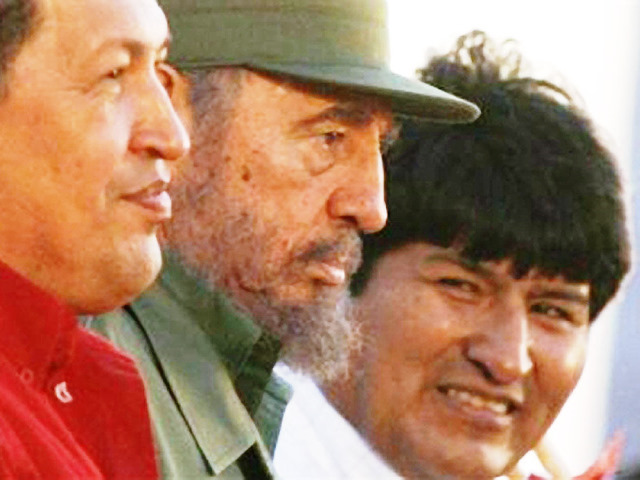
America's cold war in Latin America heated up this week. On Wednesday, the Bolivian president Evo Morales expelled the US ambassador Phillip Goldberg, accusing him of supporting revolt and riot in several rebel states. As Morales put it, the expulsion was part of the indigenous peoples' rejection of "the American empire." Morales, himself an an Aymara Indian, came to power in a landslide victory in 2006--making him the first indigenous President in 470 years in Bolivia. With his moves to support the poor and nationalization of Bolivia's all-important gas reserves, he quickly found himself surrouned by enemies--both within and without the country. This past August, wealthy (whites and lighter-skinned mestizos) interests in the eastern states attempted to secede from the country, forcing Morales to undergo a national referendum--which he won handily, getting a vote of confidence from over 67% of Bolivians. Not content with democracy, the rich rebels have decided to create disorder in the hopes of destabilizing the government, blowing up pipelines and killing government supporters.
It is a tactic that is all too familiar in Latin America, where leftist governments--even when democratically elected--are plagued by often wealthy interests and right-wing paramilitaries. Venezuela is a similar case in point, where members of the mostly white and lighter skinned upper class created strikes to paralyze the Hugo Chavez government. When that did not work, the television and radio--also owned by wealthy interests--boldly endorsed a coup hatched by their fellow right leaning cohorts. In an act of "people power" however, masses of poor people took to the streets, restoring Chavez back into power. It was a counter-coup, driven by the poor. Given its blood-stained history in Latin America in the past hundred years, the US is often seen as directly behind these events. Their role in the Chavez coup has been heavily suspected. And when not pushing for the coup, they are usually found to have direct or indirect ties with the wealthy right-wing interests.
Now it seems, Latin America is striking back. In the wake of Bolivia's explusion, Venezeula followed suit and expelled its US ambassador. Other regional countries, from Nicaragua to Ecuador to Honduras, while not doing the same, have voiced their support for Bolivia. The US retaliated by expelling the diplomats of the "offending countries," and has threatened to put them both on a drug-trafficking list. Meanwhile, Venezuela, in a direct dig at the US, plans joint military exercises with Russia in upcoming months.
Where this goes next, will be something to watch.
Some articles on the conflict:
Revolt of the Rich
Despite winning last month's recall election, President Evo Morales faces escalating violence from protesters who don't want to share the nation's natural-gas wealth.
A Matter of Morals, Not Morales: Respect Bolivia's Democracy!
As an American and an expert on US-Venezuela relations, the events unfolding in Bolivia are simply too familiar to escape my notice. The tactics used by opponents of President Chavez during Venezuela's short-lived coup in 2002 are currently being replicated in a "civic coup" in neighboring Bolivia that is designed to undermine the democratic government of Evo Morales.
Bolivia’s Elites Seek a Media Coup
Bolivia's popular movements are attempting to use democracy and a legitimate government to advance an agenda of sovereignty, greater equality, and development. Their opponents, led by several governors of the wealthier provinces in a part of the country called the "media luna", are trying to use violence and sabotage to stop that agenda by provoking a civil war and chaos. The challenge to Bolivia's government and its president Evo Morales is to stop the violence without allowing the provocation to succeed. In meeting that challenge, Morales has the support of most of the Latin American governments. His opponents have the support of the United States government.
Morales Adherents Gunned Down in Pando
Bolivian regional commissioner arrested after peasant supporters of the president are murdered. "We scattered, since we had no way to defend ourselves," explains Rodrigo Melina, an escapee from the carnage. "People were throwing themselves in the river and it was unbelievable: they machine-gunned those who tried to cross." Since the beginning of the week, chilling testimonies proliferate and they all tell how a group of peasants faithful to President Evo Morales, armed only with sticks, fell into an ambush laid by armed men last week, about 30 kilometers from Cobija, capital of the Amazonian Pando region (northern Bolivia).
Background:
US Eyes Bolivia's Morales as Radical Who Has Nation's Ear
VILLA TUNARI, Bolivia - To the Bush administration, Evo Morales is a drug-funded leftist Bolivian congressman who's turned the support of coca growers into a political movement that threatens the country's wobbly democracy. To millions of Bolivians, he's a hero who grows in stature with every kick from Washington.
Sunday, September 14, 2008
Latin America Strikes Back!
Posted by
THE ARCHITECT
at
10:24 PM
![]()
Labels: American Foreign Policy, Evo Morales, Hugo Chavez, Latin America
Subscribe to:
Post Comments (Atom)



No comments:
Post a Comment